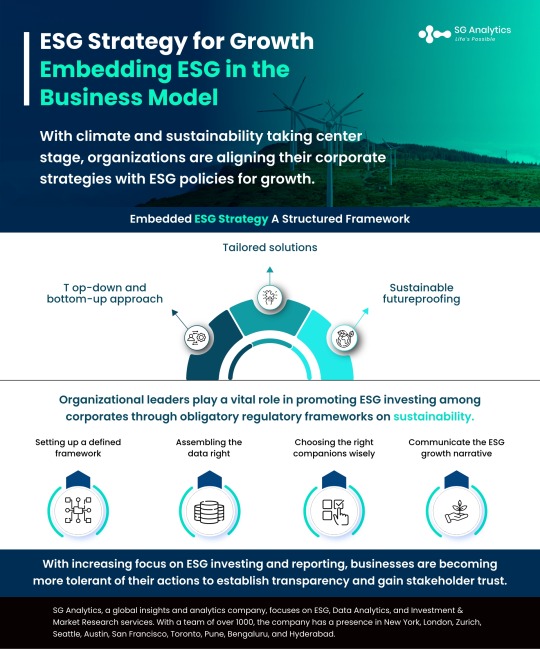#esg strategy
Explore tagged Tumblr posts
Text
ESG Reporting: Key Strategies for Corporate Sustainability
ESG Reporting Guide: Promoting Sustainability and Accountability Environmental, Social, and Governance (ESG) reporting has become an important aspect of corporate social responsibility, bringing transparency and accountability to an organization's sustainability efforts. By implementing ESG reporting, companies can not only meet legal requirements but also demonstrate ethical practices and commitment to protecting the environment. Here we provide a detailed overview of the key steps and considerations for ESG reporting. The growing importance of ESG reporting ESG reporting enables companies to disclose their impacts on environmental, social, and governance aspects. It serves as an important tool for stakeholders such as investors, customers, and regulators to evaluate an organization's sustainability efforts. Increasing consumer demand for responsible practices and strong regulatory ESG frameworks further highlights the need for a comprehensive ESG strategy. Key steps in ESG reporting Understand ESG reporting requirements Companies must first identify the relevant regulatory frameworks and voluntary standards that apply to their business activities. The most important frameworks are: Develop an ESG strategy Developing a sustainability strategy involves developing a robust ESG strategy, which includes conducting a materiality assessment to identify the issues that are most important to stakeholders and the company. Based on these insights, clear goals and key performance indicators (KPIs) should be set to measure and track progress over time. Collect and manage ESG data Accurate and reliable data is the foundation of ESG reporting. Organizations should collect data in several categories, including: Environmental: carbon emissions, water consumption, waste management Social: workforce diversity, labor practices, community engagement Governance: business ethics, board diversity, risk management A robust data management system is essential to ensure quality and consistency. Report Structure and Design ESG reports should be structured to align with the chosen framework. A clear, concise and comprehensive format is essential for effective communication. Involving stakeholders during the reporting process ensures that the final document addresses their concerns and expectations. Assurance and Validation To increase credibility, companies may consider obtaining third-party assurance for their ESG reports. Independent verification increases the reliability and credibility of the disclosed information. Communicating the ESG Report Once completed, the ESG report should be published on the organization's website and distributed through various channels such as press releases, investor meetings, and social media platforms. Proactive communication ensures that stakeholders are well informed about the company's sustainability efforts. Benefits of ESG Reporting There are several benefits to ESG. By implementing a comprehensive ESG reporting process, organizations can: Improve market access by adapting to global regulatory standards. Improve your reputation and build stakeholder trust. Identify areas for innovation and competitive advantage. Ensure compliance with ESG regulations and minimize the risks associated with non-compliance and unsustainable practices. Partner with Freyr for ESG excellence Freyr Solutions offers comprehensive expertise in sustainability and ESG reporting to help companies stay ahead of the evolving regulatory environment. Freyr provides end-to-end support for your ESG initiatives, from collecting ESG data and structuring ESG reports, to third-party assurance and stakeholder engagement. Leveraging Freyr's expertise, companies can produce accurate, reliable and impactful ESG reporting, setting them on the path to long-term success in a sustainability-driven world. If you'd like to learn more about how we can support you in your ESG journey, contact Freyr today.
#ESG Reporting#Sustainability Reporting#Corporate Sustainability#Environmental#Social#and Governance#ESG Strategy#ESG Data Collection#ESG Frameworks#ESG Assurance
0 notes
Text
ESG Strategy: A Roadmap to Sustainable Success
In today's corporate landscape, Environmental, Social, and Governance (ESG) strategies have transitioned from being a trend to a business necessity. As stakeholders increasingly demand ethical practices, environmental stewardship, and accountability, companies that prioritize ESG gain competitive advantages, enhance reputations, and secure long-term success. Crafting an effective ESG strategy requires a structured approach, commitment, and alignment with the organization’s values and goals. Here, we explore the essential components of a robust ESG strategy and how companies can implement one effectively.
Understanding ESG: The Foundation
An ESG strategy integrates environmental, social, and governance considerations into business operations and decision-making. These pillars address critical areas:
Environmental: Managing a company's impact on natural resources, including energy consumption, waste management, carbon emissions, and biodiversity preservation.
Social: Focusing on relationships with employees, communities, and stakeholders, emphasizing diversity, equity, inclusion, and social responsibility.
Governance: Strengthening corporate governance practices, including leadership ethics, transparency, and compliance with regulatory standards.
A comprehensive ESG strategy balances these three dimensions to create value for shareholders and society while reducing risks.
The Need for a Thoughtful ESG Strategy
Investor Attraction: ESG performance influences investment decisions, with many institutional investors prioritizing sustainable portfolios.
Regulatory Compliance: Governments worldwide are introducing stricter ESG regulations, making compliance essential to avoid legal and financial penalties.
Market Differentiation: Companies with strong ESG practices can differentiate themselves in competitive markets, appealing to conscious consumers.
Risk Management: Identifying ESG risks, such as climate change or labor disputes, helps organizations mitigate potential disruptions.
Employee Engagement: ESG-focused organizations often see higher employee satisfaction, as workers feel aligned with purpose-driven goals.
Key Steps to Building an ESG Strategy
Assessment and Goal Setting Begin with a thorough assessment of current ESG practices. Use benchmarks, audits, and stakeholder feedback to identify gaps and opportunities. Set SMART (Specific, Measurable, Achievable, Relevant, Time-bound) goals to address these areas. For instance, aim to reduce carbon emissions by 40% over five years or achieve gender parity in leadership within three years.
Stakeholder Engagement An effective ESG strategy aligns with the expectations of various stakeholders, including investors, customers, employees, and regulators. Open communication channels and regular updates foster trust and ensure alignment with societal values.
Integration into Core Business Embed ESG considerations into every aspect of the organization. For example, supply chains should prioritize ethical sourcing, and product development should minimize environmental impacts. Aligning ESG initiatives with business objectives ensures sustainability efforts contribute to financial performance.
Materiality Assessment Identify material issues most relevant to your industry and stakeholders. In technology, data privacy might be critical, while in manufacturing, carbon emissions and waste reduction could take precedence. Prioritize these areas to focus resources effectively.
Implementation and Monitoring Develop actionable plans and allocate responsibilities for achieving ESG targets. Invest in necessary resources, such as technology for emissions tracking or training programs for diversity and inclusion. Regular monitoring using KPIs ensures progress remains on track.
Transparency and Reporting Publish ESG performance through standardized reporting frameworks like GRI (Global Reporting Initiative), SASB (Sustainability Accounting Standards Board), or TCFD (Task Force on Climate-related Financial Disclosures). Transparency demonstrates accountability and builds stakeholder trust.
Continuous Improvement ESG is a dynamic field; strategies should evolve with emerging trends, technologies, and regulatory changes. Periodic reviews and updates are crucial to maintaining relevance and effectiveness.
Challenges in Implementing ESG Strategies
Despite its importance, ESG adoption presents challenges:
Data Collection and Accuracy Gathering reliable data across supply chains and operations is often complex, especially in industries with diverse global footprints.
Cost Implications Transitioning to sustainable practices may require significant initial investments, which can deter smaller enterprises.
Cultural Resistance Shifting corporate culture to embrace ESG values demands extensive change management efforts, particularly in traditional industries.
Regulatory Variability With differing ESG regulations across regions, multinational corporations face the challenge of ensuring compliance on multiple fronts.
Greenwashing Risks Superficial ESG efforts can lead to accusations of greenwashing, damaging trust and reputation. Authenticity is essential to avoid such pitfalls.
Success Stories: Companies Leading the ESG Charge
Patagonia: Known for its environmental advocacy, Patagonia’s business model prioritizes sustainability, from ethical sourcing to donating profits to environmental causes.
Unilever: Its Sustainable Living Plan integrates ESG into product innovation, resulting in reduced environmental impact and stronger customer loyalty.
Microsoft: By committing to being carbon negative by 2030, Microsoft demonstrates how technology companies can lead on environmental goals.
The Future of ESG Strategies
As the world confronts challenges like climate change, social inequities, and corporate accountability, ESG strategies will play an increasingly central role. Advancements in technology, such as AI-driven analytics and blockchain for transparency, are revolutionizing ESG practices, enabling more precise measurements and impactful interventions.
Moreover, regulatory frameworks are expected to standardize, leveling the playing field and ensuring that all businesses adhere to fundamental ESG principles. Companies that proactively adapt will find themselves better equipped to navigate this evolving landscape.
Conclusion
An effective ESG strategy is more than a compliance exercise; it’s a driver of innovation, resilience, and sustainable growth. By embedding ESG into their operations, companies can address global challenges while unlocking new opportunities for success. As stakeholders increasingly prioritize sustainability, those who lead with purpose will shape the future of business.
For more information click here: ESG Strategy
0 notes
Text
You don't need to give up gains to pursue an ESG strategy in the stock market
“Brian Burrell of Thornburg explains how combined ESG and financial analysis can identify companies whose improved profitability is directly tied to their efforts to make the world a better place” [COMMENTARY] Strictly speaking companies adhering to rigorous ESG principles should perform optimally and thus outperform in operational, financial, and stock market metrics. You don’t need to give up…
0 notes
Text

AI is Essential for Achieving ESG Goals and Tackling Climate Change
The Right Tools
The incorporation of environmental, social, and governance (ESG) goals into corporate strategies is essential for addressing global climate change. However, achieving these ambitious targets requires the right tools, and AI is at the forefront. AI-driven analytics can process vast datasets to provide actionable insights, enabling companies to make informed decisions that align with their ESG objectives.
Improved Accountability
Accountability is a critical component of ESG. AI enhances transparency by tracking and reporting on various metrics in real time. For example, AI can monitor greenhouse gas emissions, water usage, and energy consumption, ensuring that organizations stay on course. According to the World ESG and Climate Summit, AI-driven accountability solutions have already improved compliance rates by 30%.
Using AI to Set and Achieve Better Goals
AI can also help organizations set realistic yet ambitious ESG goals. Machine learning algorithms can predict future environmental impacts based on current data, allowing companies to adjust their strategies proactively. For instance, Google's AI has enabled it to achieve a 93% accuracy rate in predicting its energy needs, significantly reducing its carbon footprint.
Case Studies
Microsoft: By leveraging AI, Microsoft has managed to reduce its carbon emissions by 15% over two years, as reported in their annual sustainability report.
Unilever: Using AI, Unilever has optimized its supply chain, resulting in a 20% reduction in waste and a 10% increase in energy efficiency.
FAQs
Q1: What role does AI play in ESG?
A1: AI helps in data analysis, improving transparency, setting realistic goals, and enhancing overall accountability.
Q2: Are there any successful case studies?
A2: Yes, companies like Microsoft and Unilever have successfully integrated AI to meet their ESG goals.
In conclusion, the integration of AI is not merely beneficial but essential for meeting ESG goals and addressing climate change effectively. To learn more, visit World ESG and Climate Summit.
0 notes
Text
ESG 行銷在香港企業界的影響

近年來,環境、社會和治理(ESG)的概念已成為全球企業關注的焦點,香港也不例外。隨著企業和投資者越來越認識到可持續和負責任的實踐的重要性,ESG 行銷已成為提升企業聲譽和推動業務增長的重要工具。但是,ESG 行銷在香港的企業界真的有影響嗎?公司如何利用 ESG 行動獲得競爭優勢,這對其整體成功有何影響?
ESG 在香港的重要性不斷提升
由於多種因素,包括監管變革、投資者需求和社會期望,香港的 ESG 重要性顯著提升。香港交易及結算所有限公司(HKEX)實施了嚴格的 ESG 報告要求,要求上市公司披露其環境、社會和治理實踐。這些法規旨在促進企業部門的透明度、問責制和可持續性。
此外,投資者在投資決策中越來越重視 ESG 因素,認識到具有強大 ESG 表現的公司更能管理風險並抓住機會。這種投資者行為的轉變促使許多公司加強其 ESG 行動,並通過 ESG 行銷有效地傳達這些努力。
ESG 行銷的角色

ESG 行銷涉及向投資者、顧客、員工和社區等利益相關者推廣公司的 ESG 行動。有效的 ESG 行銷可以幫助公司建立信任,提升其聲譽,並在競爭中脫穎而出。以下是 ESG 行銷在香港企業界帶來影響的方式:
建立信任和可信度:
透明地傳達 ESG 努力的公司更容易贏得利益相關者的信任。例如,一家公司如果強調其減少碳排放、支持本地社區和確保倫理治理的承諾,就可以建立積極形象並建立可信度。這種信任對吸引和留住顧客、投資者和人才至關重要。
吸引投資:
投資者越來越尋找具有強大 ESG 資質的公司。有效的 ESG 行銷可以突顯公司的可持續實踐和長期價值主張,使其對 ESG 專注的投資者更具吸引力。通過展示其可持續性的承諾,公司可以接觸更廣泛的資金來源並提高估值。
增強顧客忠誠度:
香港及全球的消費者越來越關注其購買行為的環境和社會影響。有效地行銷其 ESG 行動的公司可以區分自己並吸引優先考慮可持續性的顧客。例如,一家推廣其使用環保材料和公平勞動實踐的時裝品牌,可以吸引道德消費者。
改善員工參與度:
員工越來越希望為與其價值觀一致的公司工作。有效的 ESG 行銷可以通過展示公司對產生積極影響的承諾來提高員工士氣並吸引頂尖人才。例如,一家科技公司強調其減少碳足跡和促進多樣性和包容性的行動,可以創造一個更有動力和忠誠的工作團隊。
案例分析:香港的 ESG 行銷成功
幾家公司在香港成功利用 ESG 行銷來提升其聲譽並推動業務增長。以下是一些例子:
太古地產(Swire Properties): 太古地產在可持續發展方面一直是領導者,其行動集中於能效、綠建築認證和社區參與。通過有效的 ESG 行銷,該公司傳達了其可持續成就,贏得了利益相關者的認可和信任。
中電控股(CLP Holdings): 作為主要能源公司,中電控股強調其向低碳經���過渡的承諾。該公司的 ESG 行銷努力突顯了其在可再生能源和創新技術方面的投資,使其成為能源行業的前瞻性領導者。
滙豐(HSBC): 滙豐將 ESG 因素整合到其業務策略和投資決策中。通過推廣其可持續金融行動和支持綠色項目,滙豐加強了其作為負責金融機構的品牌。
ESG 行銷的挑戰
儘管 ESG 行銷帶來諸多好處,但也存在挑戰。公司必須確保其 ESG 聲明可信且有實際行動支撐。綠色洗白(greenwashing)——即公司誇大或偽造其 ESG 努力——可能損害聲譽並侵蝕信任。因此,透明度和真實性對於 ESG 行銷至關重要。
此外,公司必須跟上不斷變化的 ESG 標準和法規。聘請 ESG 顧問(ESG 顧問)可以幫助公司制定健全的 ESG 策略並有效地傳達其努力。ESG 顧問提供有價值的見解和指導,確保公司的 ESG 行動符合最佳實踐和利益相關者的期望。
精英亞洲的全面 ESG 行銷服務

精英亞洲(Elite Asia)可以幫助您提供全面的 ESG 行銷服務,從 ESG 行銷策略、品牌知名度、ESG 品牌訊息、ESG 活動推廣等方面,協助您的公司在這一領域取得成功。
結論
ESG 行銷對香港的企業界產生了重大影響。通過有效地傳達其 ESG 行動,公司可以建立信任,吸引投資,增強顧客忠誠度,並改善員工參與度。然而,成功的 ESG 行銷需要真實性、透明度和對可持續性的真正承諾。隨著 ESG 重要性的��續提升,香港的公司必須利用 ESG 行銷來應對不斷變化的環境,實現長期成功。您的公司準備好利用 ESG 行銷的力量來產生影響嗎?邁向可持續未來的旅程始於對負責任實踐和有效溝通的承諾。
#ESG marketing#Hong Kong corporate landscape#ESG initiatives#sustainable business#environmental responsibility#social responsibility#governance practices#ESG compliance#ESG 顧問#ESG strategy#brand awareness#ethical business#low-carbon economy#renewable energy
0 notes
Text
Delve into the significance of ESG criteria in investment decisions, and how it goes beyond financial performance to assess a company's sustainability and ethical practices.
For more such blogs: Visit our blog site today: https://tradingbells.com/blogs And for Financial Advice reach us at: https://tradingbells.com/ Phone: +91 932 953 6100
0 notes
Text
Unlocking Success Through Open Communication: Effective Grievance Resolution Strategies (vectra-intl.com)
Cultivating a Culture of Open Communication: Strategies for Grievance Resolution
0 notes
Text
A notable trend toward sustainable and ethical business practices has been observed in the last few years in the global business scene. Sustainability, Corporate Social Responsibility (CSR) standards are now essential considerations for investors, companies, and legislators. In emerging economies like India, where sustainable development is becoming more and more important, this paradigm shift is especially vital. This blog examines the role that ESG plays in creating a resilient and ethical business ecosystem, as well as its significance in the Indian economy.
0 notes
Text
Data-Driven ESG Compliance: Challenges, Opportunities, and Best Practices

In the wake of a recent Supreme Court decision on affirmative action, concerns arose about potential challenges to environmental, social, and governance (ESG) strategies. However, ESG isn’t just political; it’s fundamentally good for business. Research shows a positive correlation between ESG performance and financial value creation.
At Hitachi America, Ltd. R&D, we’re actively co-creating sustainable digital solutions, committed to decarbonizing our operations and achieving global carbon neutrality in our value chain by 2050.
Despite the positive trajectory, challenges persist. Accurate ESG data is crucial, yet its availability and quality often hinder sustainable investment adoption. Regulatory concerns also loom, with worries that ESG regulations might limit business options. Additionally, smaller and minority-owned firms, while willing, struggle to incorporate ESG due to financial constraints.
To navigate these challenges, a holistic data-driven approach to ESG is essential.
Creating comprehensive audit trails around data ensures measurable ESG decisions throughout supply chains.
Standardized, globally coordinated ESG disclosure standards are vital, helping investors and stakeholders make informed decisions.
Companies must integrate ESG directly into their operations, making it a part of their core strategy.

Hitachi’s Take on ESG and Sustainability
Hitachi is actively working to facilitate the adoption of ESG practices, believing in the transformative power of sustainability. ESG-focused investments are on the rise, indicating a shifting paradigm in investment strategies. In this dynamic environment, actionable ESG practices will be instrumental, in guiding organizations toward a more sustainable future for all.
Learn how Hitachi is working to help companies make it easier to adopt and integrate ESG practices into their businesses. https://social-innovation.hitachi/en-us/think-ahead/manufacturing/actionable-esg-compliance-for-businesses/
#sustainability#decarbonization#esg#esg reporting#esg data analytics#esg data management#esg investing#esg financing#esg strategy#esg compliance
0 notes
Text
Discover cutting-edge environmental sustainability consulting services. Our experts guide you towards eco-friendly practices, ensuring your business contributes to a healthier planet. Elevate your environmental stewardship.
1 note
·
View note
Text
The Key to a Sustainable Future with Agile ESG Strategy

Agile ESG Strategy is more than just a buzzword; it is a dynamic approach that recognizes the need for flexibility in addressing the interconnected challenges of environmental impact, social responsibility, and governance practices.
0 notes
Text
Agile ESG Strategy: Navigating Sustainability in a Dynamic World

an Agile ESG Strategy is a powerful approach for organizations navigating the complexities of today's business environment.
0 notes
Text

With increasing focus on ESG investing and reporting, businesses are becoming more tolerant of their actions to establish transparency and gain stakeholder trust.
#ESG Strategy#corporate strategy#sustainability strategy#business sustainability strategies#corporate and business strategy#long-term business goals#strategic business consulting
0 notes
Text
Culinary Experiences: Food & Beverage Consultant Services by Prof. Consulting Group in Melbourne
In the dynamic and ever-evolving food industry, achieving culinary excellence and staying ahead of the competition requires a combination of creativity, expertise, and strategic planning. That’s where food consultants come in. Based in Melbourne, Prof. Consulting Group is a renowned name in the field of food and beverage consultancy. In this blog post, we will explore the valuable services offered by Prof. Consulting Group, focusing on how their expertise can elevate culinary experiences for businesses in the Melbourne area.
Culinary Concept Development:
Prof. Consulting Group specializes in developing innovative and unique culinary concepts tailored to the client’s target market and vision. Their team of experienced food consultants works closely with businesses to understand their goals, target audience, and brand identity. By leveraging their expertise in food trends, market research, and consumer preferences, Prof. Consulting Group creates compelling concepts that differentiate businesses in the competitive food industry.
Menu Engineering and Optimization:
Menus play a crucial role in customer satisfaction and profitability. Prof. Consulting Group offers menu engineering and optimization services to help businesses maximize their menu’s potential. They analyze the existing menu, considering factors such as dish popularity, profitability, and market trends. With their insights, they assist in designing menus that showcase the right balance of flavors, price points, and variety, ultimately enhancing the dining experience and driving revenue.
Culinary Training and Staff Development:
The success of any food establishment relies heavily on well-trained and skilled staff. Prof. Consulting Group provides comprehensive culinary training and staff development programs. These programs cover various aspects, including food preparation techniques, cooking methods, plating and presentation, food safety, and customer service. By enhancing the skills and knowledge of the culinary team, businesses can consistently deliver exceptional dining experiences that exceed customer expectations.
Quality Assurance and Supplier Management:
Maintaining consistent quality in the food and beverage offerings is paramount. Prof. Consulting Group assists businesses in implementing robust quality assurance programs, ensuring that ingredients, recipes, and processes meet the highest standards. They also provide guidance on supplier selection, negotiation, and ongoing management, helping businesses source the finest ingredients and products while optimizing costs.
Operational Efficiency and Profitability:
Prof. Consulting Group understands the intricacies of running a successful food business. They offer expertise in operational efficiency, helping businesses streamline their processes, optimize workflows, and reduce costs without compromising on quality. By conducting thorough assessments, Prof. Consulting Group identifies areas for improvement, recommends solutions, and assists in implementing efficient systems, leading to enhanced profitability.
Culinary Trends and Innovation:
Staying updated with the latest culinary trends is crucial for remaining relevant in the industry. Prof. Consulting Group keeps a pulse on emerging food trends, innovations, and consumer preferences. They provide valuable insights and guidance on incorporating these trends into businesses’ offerings, ensuring that they stay ahead of the curve and continue to delight customers with exciting and on-trend culinary experiences.
Conclusion:
Prof. Consulting Group offers comprehensive food and beverage consultant services in Melbourne, empowering businesses to elevate their culinary experiences. From concept development to menu engineering, staff training, quality assurance, and operational efficiency, their expertise covers various aspects crucial for success in the food industry. By partnering with Prof. Consulting Group, businesses can tap into their knowledge and experience, gaining a competitive edge and delighting customers with exceptional culinary offerings
#marketing#food and beverages#food consulting#food and beverage consultant#FMCG Consultant#esg services#esg strategy
1 note
·
View note
Text

7 Emerging Trends in ESG
What's Changing the ESG Landscape?
Environmental, Social, and Governance (ESG) factors are becoming increasingly significant for businesses worldwide. Here are seven key trends reshaping the ESG landscape:
Climate Resilience: Companies are prioritizing long-term climate strategies. The World Economic Forum reports that climate-related risks top global concerns.
Green Finance: Investment in sustainable projects is on the rise. Green bonds hit a record $300 billion in 2022.
Transparency and Reporting: More stringent regulations are emerging. The Sustainable Finance Disclosure Regulation (SFDR) by the EU seeks to improve transparency.
Social Equity: Companies are focusing on diversity and inclusion. For example, Salesforce has committed to a diverse workforce with 50% women by 2025.
Supply Chain Responsibility: Brands are ensuring sustainability across their supply chains. Nike’s “Move to Zero” initiative aims to achieve zero carbon and zero waste.
Technological Integration: AI and blockchain are used for better ESG data management. IBM’s blockchain technology helps track ethical sourcing.
Stakeholder Engagement: Businesses are involving stakeholders in their ESG initiatives. Unilever’s Sustainable Living Plan has garnered significant consumer support.
How to Extract Value from ESG?
Enhanced brand reputation, investment opportunities, and regulatory compliance are key benefits for companies with strong ESG practices. Positive public attention, outperforming ESG funds, and adherence to regulations like the EU’s CSRD highlight the importance of sustainability.
FAQs
Q1: What is ESG?
A1: ESG stands for Environmental, Social, and Governance, crucial factors in measuring a company's ethical impact.
Q2: Why is ESG important?
A2: ESG factors contribute to long-term sustainability and can improve financial performance.
Q3: How can companies start with ESG?
A3: Begin by assessing current practices, setting clear goals, and regularly reporting progress.
Case Studies
Patagonia is known for its environmental initiatives, including using recycled materials in products.
Google has achieved 100% renewable energy for its global operations, setting a benchmark for tech companies.
For more detailed insights, visit the World ESG and Climate Summit.
By staying ahead of these emerging ESG trends, businesses can not only contribute to a sustainable future but also unlock significant value.
0 notes
Text
ESG Strategy - What is It, and Why Does It Matter?
Many enterprises embed ESG principles into their central corporate strategy. Therefore, tailored solutions that optimize each company's procedural frameworks for sustainable development have become available throughout the world. However, data quality and reporting ease are the two challenges in crafting or deploying an effective ESG strategy. Thankfully, some tools and services can help organizations align their activities with more eco-friendly and socially responsible values.
0 notes